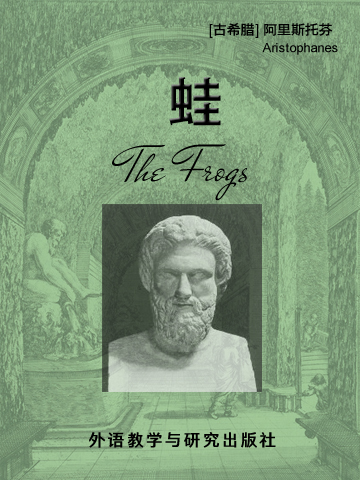The scene shows the house of HERACLES in the background. There enter two travellers: DIONYSUS on foot, in his customary yellow robe and buskins but also with the club and lion's skin of Heracles, and his servant XANTHIAS on a donkey, carrying the luggage on a pole over his shoulder.
XANTHIAS
Shall I crack any of those old jokes, master,
At which the audience never fail to laugh?
DIONYSUS
Aye, what you will, except "I'm getting crushed":
Fight shy of that: I'm sick of that already.
XANTHIAS
Nothing else smart?
DIONYSUS
Aye, save "my shoulder's aching."
XANTHIAS
Come now, that comical joke?
DIONYSUS
With all my heart.
Only be careful not to shift your pole,
And-
XANTHIAS
What?
DIONYSUS
And vow that you've a belly-ache.
XANTHIAS
May I not say I'm overburdened so
That if none ease me, I must ease myself?
DIONYSUS
For mercy's sake, not till I'm going to vomit.
XANTHIAS
What! must I bear these burdens, and not make
One of the jokes Ameipsias and Lycis
And Phrynichus, in every play they write,
Put in the mouths of their burden-bearers?
DIONYSUS
Don't make them; no! I tell you when I see
Their plays, and hear those jokes, I come away
More than a twelvemonth older than I went.
XANTHIAS
O thrice unlucky neck of mine, which now
Is getting crushed, yet must not crack its joke!
DIONYSUS
Now is not this fine pampered insolence
When I myself, Dionysus, son of-Pipkin,
Toil on afoot, and let this fellow ride,
Taking no trouble, and no burden bearing?
XANTHIAS
What, don't I bear?
DIONYSUS
How can you when you're riding?
XANTHIAS
Why, I bear these.
DIONYSUS
How?
XANTHIAS
Most unwillingly.
雅典即将落败,城邦深陷困顿,苟延残喘之际,《蛙》以喜剧的形式,给雅典人无限的安慰,甚至是希望。给以安慰的不紧是一时捧腹带来的忘却,这部喜剧获得这般殊荣,包涵更重的是,对于往昔辉煌无限眷恋的目光,对于当下抱有挽回与拯救的期许。
The Frogs is a comedy written by the Ancient Greek playwright Aristophanes. It was performed at the Lenaia, one of the Festivals of Dionysus in Athens, in 405 BC, and received first place.
- FROGS
- 书评 写书评
- 笔记
-
书评加载中...






















 京公网安备 11010802032529号
京公网安备 11010802032529号
笔记加载中...